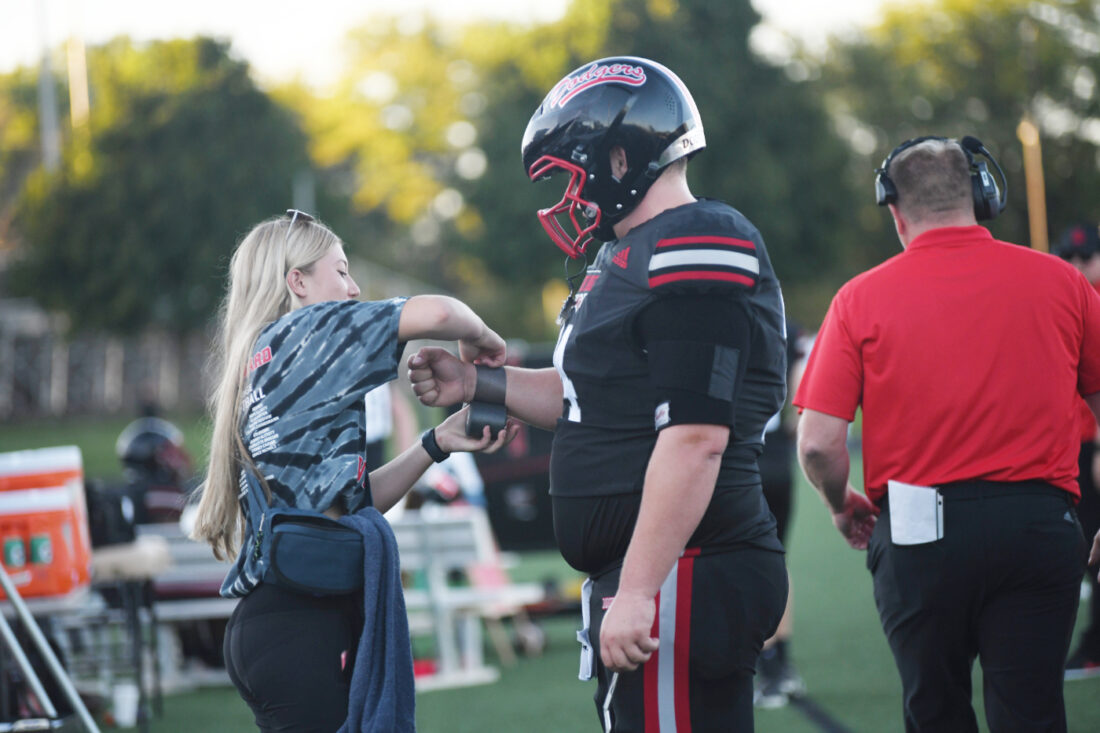Helping hand

Three years ago, Fort Dodge Senior High athletic trainer Bre Drees had an idea to get students hands-on experience outside of the classes she taught.
This fall, the decision has paid off in a big way.
Drees had several students express an interest in helping on the sidelines during athletic events — mainly during football season. She had four students who became athletic training aides that first year.
This season, with a much bigger group, those students have also taken on a much bigger role.
Drees, who has been the athletic trainer for nearly 15 years, was diagnosed with breast cancer over the summer. Her treatments and surgery kept her away from the sidelines this fall.
In her place, the athletic training aides have stepped in and collectively helped to fill Drees’ role in her absence.
“Last spring, I knew I would be missing at least a little bit of football,” said Drees, who returns to the sidelines this week. “I didn’t know it would be as much as it was. They took on a little bit everything. They did everything themselves.
“Before I left, I made a list of what needed to be set up for home games. They started practicing taping so they knew how to do everything.”
There are usually at least two girls at each home game, often more, and they have been traveling to away games as well, Drees added.
“They communicate with the other athletic directors when we get to games. They have to go outside of their comfort zone when they have those conversations,” Drees said.
“They have grown up a lot.”
Drees stated the girls can do just about everything other than assess injuries. She said Grant Wilson, an orthopedic PA from CNOS, and Riley Anderson, with UnityPoint, have been available for injury evaluation.
The girls helping this year include Maeleena Meyer, Grace Behrens, Jonaya Foy, Layla Ellis, Lily Kliegl, Lily Sheeder, Makayla Liska and Katelyn Gehlausen.
Katie Moser, a teacher at FDSH who has a background in exercise science, has worked with the girls as well.
“I wanted to be an athletic training aide because coming into high school, I was interested in sports medicine,” said Kliegl, a sophomore. “I like being able to help wherever it’s needed and learning more about injuries and the medical aspect to what Bre does.
“I also like the friendships I’ve built. The biggest challenge is how time consuming it can be.”
Drees started out with three senior girls when Meyer was a freshman. After they graduated, she recruited other students who had shown interest in athletic training.
“We wanted to find athletes who understand sports. They understand being around the atmosphere of football and the intensity of the game. That was important,” Drees said. “Trying to find student-athletes is tough. They are involved in so much, but it’s really worked out well for us.”
Drees added their roles extend beyond varsity games on Friday nights.
“They go to practices as much as they can. They have traveled with the freshman and JV teams. At home games, they completely set up the sidelines,” Drees said. “They do just about everything on the sidelines.
“They help stretch athletes, and set up coolers for pregame and halftime. They set up the water and ice on the sidelines. They make sure all the emergency equipment is on the sidelines that we may need.”
Drees said most of the girls will help with winter sports as well if their schedule permits. They usually are needed during home wrestling meets, like the Don Miller Invitational, as well as girls events, JV meets, and if the Dodgers host districts.
“It’s great that they can experience all of this first-hand,” said Drees. “They can get an idea of what they want for a career.”
The girls who started with Drees that first year have all gone into some sort of education leading toward a career in the medical field. Alexis Ross is studying to be a nurse; Eileen Fierke is going into athletic training; and Kyrstin Waychoff is studying medicine in college.
“We used to have managers, and while they were helpful with running and getting things, they didn’t have much to do with the medical side. I really wanted to have someone who could help me,” Drees said. “We talk about emergency procedures, we talk about bloodborne pathogens. They want to help with documentation.
“They know so much more than a typical manager would know.”
Kliegl added, “It’s a team effort, and we do our best and help out as much as we can with Bre being out. She goes above and beyond to help the athletes at FDSH, so it’s important to show up to help fill her shoes a little bit and help the players as well.”




